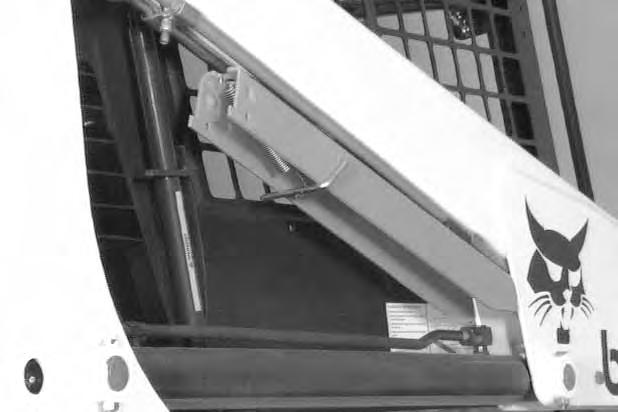TRANSPORTING THE BOBCAT LOADER
A
Adequately designed ramps of sufficient strength are needed to support the weight of the machine when loading onto a transport vehicle. Wood ramps can break and cause personal injury.
W–2058–0494
SUPPORT MC–01241
When a loader has an empty bucket or no attachment, always drive backward onto the transport vehicle [A]. The rear of the trailer must be blocked or supported [A] when loading or unloading the loader to prevent the front end of the trailer from raising up.
B
Use the following procedure to fasten the Bobcat loader to the transport vehicle to prevent the loader from moving during sudden stops or when going up or down slopes [B].
Both Sides
• Lower the bucket or attachment to the floor.
P–10448
P–05077
• Stop the engine. • Engage the parking brake. • Install chains at the front and rear loader tie down positions (Inset) [B]. • Fasten each end of the chain to the transport vehicle. TOWING THE LOADER To prevent damage to the loadershydrostatic system, tow the loader only a short distance at slow speed. (Example: Moving the loader onto a transport vehicle). The towing chain (or cable) must be rated at 1 & 1/2 times the weight of the loader . (See SPECIFICATIONS Page 93.) • Turn the key switch to ON and press the traction lock override button. 6707867
• Tow the Bobcat at 2 MPH (3,2 km/hr) or less for not more than 25 feet (7,6 meters).
MC–01242
If the electrical system is not functioning, contact your Bobcat loader dealer. (Part of the brake system must be disassembled to move the loader.)
54 of 122
34
753 Bobcat Loader Operation & Maintenance Manual
Dealer Copy -- Not for Resale
Be sure the transport and towing vehicles are of adequate size and capacity. (See SPECIFICATIONS Page 93, for weight of loader.)





